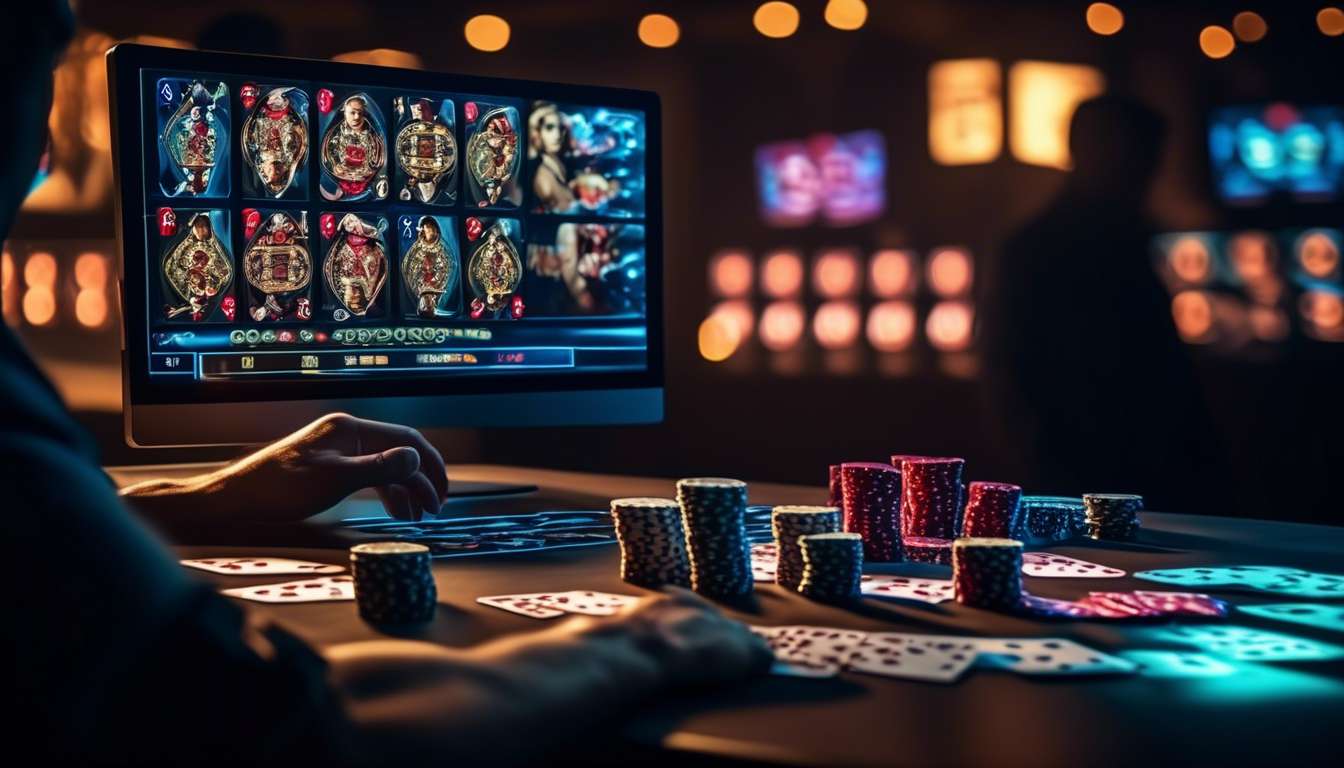In today’s digital age, we find ourselves increasingly drawn into the world of online gambling, a realm where risk and reward are just a click away. As we navigate through virtual casinos and betting platforms, it’s crucial to understand the psychological factors that keep us engaged.
Our collective fascination with online gambling is not merely a matter of chance; it is deeply rooted in the intricate workings of our minds. Together, we will explore the cognitive biases, emotional triggers, and social influences that shape our online gambling experiences.
Cognitive biases play a significant role in our gambling behavior. Some of these include:
- The illusion of control, where individuals believe they can influence outcomes.
- The gambler’s fallacy, where past events are mistakenly believed to affect future ones.
- Confirmation bias, where people focus on information that supports their preconceptions.
Emotional triggers also contribute to the allure of online gambling:
- The thrill and excitement of a potential win.
- The escape it provides from reality and everyday stress.
- The adrenaline rush from taking risks.
Social influences are another factor:
- Peer pressure and the desire to fit in with friends who gamble.
- Influence from advertisements and promotions seen on various media platforms.
- The community aspect of gambling, where players interact and share experiences.
By examining the allure of these digital platforms, we aim to uncover the underlying psychological mechanisms that fuel our behavior. Whether it’s the thrill of the potential win or the escape from reality, we are compelled to understand why we gamble.
More importantly, understanding these insights can help us make informed decisions in an increasingly digital gambling landscape.
Cognitive Biases in Gambling
Many of us fall prey to cognitive biases that distort our decision-making when we gamble online. We often find ourselves swayed by emotional triggers, leading us to make impulsive choices. Our emotions can cloud our judgment, pushing us to chase losses or bet more than we intended. It’s like we’re driven by an invisible force, where hope and excitement blur the lines of rational thinking.
Moreover, social influences play a significant role in our gambling behaviors. We might feel pressure to match the bets of others or get caught up in the excitement of a group setting, even if it’s virtual. We’re social creatures at heart, and the desire to fit in or belong can make us take risks we wouldn’t otherwise consider.
These cognitive biases and emotional triggers aren’t just abstract concepts—they’re the reality we face every time we log in to a gambling site. By recognizing them, we can:
- Make more informed decisions.
- Connect with others who understand these challenges.
Illusion of Control
The Illusion of Control in Games
We often fall into the trap of believing we can influence the outcome of games, despite the randomness that governs them. This illusion of control is a powerful cognitive bias, making us feel more confident and connected to the game and each other.
- We might choose lucky numbers or perform rituals, convinced they’ll sway the results.
- These actions, driven by emotional triggers, provide a false sense of mastery and belonging, even when the odds are against us.
Social Influences
Social influences also play a significant role. When we see friends or fellow players employing certain strategies, we’re likely to adopt them, thinking they hold secret keys to success.
- We feel part of a community, reinforcing our belief that we can beat the system together.
- This shared experience, while comforting, further entrenches the illusion of control.
Staying Grounded
Recognizing these patterns helps us stay grounded. While we can’t control the games, we can control our involvement and reactions.
Gambler’s Fallacy
The Gambler’s Fallacy
Many of us fall victim to the gambler’s fallacy, mistakenly believing that past outcomes influence future events in games of chance. We might think that a losing streak must soon end or a win is just around the corner. This is one of the cognitive biases that can lead us astray, distorting our perception of probability and chance.
Emotional Triggers
Emotional triggers often exacerbate this fallacy. The thrill of potential wins or the frustration of losses can cloud our judgment, making it harder to make rational decisions.
Social Influence
As social beings, we’re also influenced by the beliefs and actions of those around us. When:
- Friends
- Online communities
share stories of their ‘lucky’ wins following a string of losses, we might feel compelled to follow suit, hoping for similar luck. This social influence strengthens our misguided belief that luck will change based on past events.
Making Informed Decisions
By understanding these patterns, we can better navigate the world of online gambling. It allows us to make informed decisions rather than relying on faulty assumptions.
Confirmation Bias
Confirmation bias leads us to favor information that aligns with our existing beliefs, often skewing our judgment in online gambling. When we’re sure a strategy works, we tend to notice only the wins and overlook the losses. This selective attention is a classic example of cognitive biases at play.
We’re not alone in this; it’s a shared human experience, deeply rooted in our social influences and need to belong.
Echo Chambers in Gambling Communities:
- We often seek out forums or groups that reinforce our beliefs about gambling techniques.
- These communities create echo chambers that amplify our biases.
- As we engage with like-minded individuals, emotional triggers are activated, encouraging us to double down on our convictions.
- This sense of community can feel comforting, yet it blinds us to alternative perspectives that could improve our decision-making.
Overcoming Confirmation Bias:
- Recognize the Bias: Acknowledge the tendency to favor information that supports your beliefs.
- Question Assumptions: Actively challenge your own strategies and beliefs.
- Consider Diverse Viewpoints: Seek out and consider alternative perspectives.
- Shared Learning and Growth: Engage with others in a way that encourages shared learning, leading to stronger connections.
By recognizing confirmation bias, we can strive to question our assumptions and consider diverse viewpoints. This approach not only helps us make more rational gambling choices but also strengthens our connections with others through shared learning and growth.
Emotional Triggers in Gambling
Emotional Impact on Decision-Making in Online Gambling
Our emotions can hijack our decision-making in online gambling, leading us to make impulsive bets based on excitement or frustration. We often find ourselves swayed by emotional triggers that cloud our judgment.
Emotional Highs and Lows:
- When we’re on a winning streak, the rush of excitement can make us overconfident, encouraging riskier bets.
- Conversely, after a loss, frustration might push us to chase after our losses, convincing us that a win is just around the corner.
These emotional highs and lows are powerful, and they often interact with cognitive biases, such as the illusion of control or the gambler’s fallacy, to further distort our decision-making.
Social Influences:
As social beings, we’re also influenced by the behavior of others. Social influences from friends or online communities can amplify our emotional responses.
- If our peers are winning or losing, we might feel compelled to join in, seeking that sense of belonging.
Navigating the Online Gambling Landscape:
By recognizing these emotional triggers and biases, we can better navigate the online gambling landscape together.
Thrill of Potential Win
The allure of a potential win in online gambling captivates us, often driving us to make bold bets in hopes of a big payoff. This anticipation isn’t just about the money; it taps into our shared desire for excitement and success.
Cognitive biases play a significant role in this attraction:
- The illusion of control, where we overestimate our influence over random outcomes.
- Emotional triggers, such as the rush of adrenaline or the euphoria of small wins, keep us coming back, reinforcing our belief that the next big win is just around the corner.
Social influences also contribute significantly:
- We connect with others through shared experiences, discussing strategies or celebrating victories in online forums and chat rooms.
- This sense of community enhances the thrill, making us feel part of something larger.
As we chase that exhilarating win, we’re not just gambling for ourselves but engaging in a communal pursuit of triumph, driven by both individual desires and collective influences.
Escape from Reality
Many of us turn to online gambling as a way to escape the stresses of daily life, finding solace in the distraction it provides. We immerse ourselves in these digital worlds, seeking a reprieve from our worries.
Emotional Triggers and Sense of Belonging:
- This escape is often fueled by emotional triggers that encourage us to keep playing.
- It fosters a sense of belonging within virtual communities.
Cognitive Biases in Gambling:
- Our cognitive biases play a significant role in this escape.
- We might overestimate our chances of winning, convinced that our luck will change with just one more spin or bet.
- These biases, combined with the emotional highs and lows of gambling, create a powerful pull that keeps us engaged.
Awareness of Influences:
While we may find comfort in this escape, it’s essential to recognize how social influences and our own perceptions shape our experiences.
As we navigate the colorful landscape of online gambling, we should remain aware of the factors at play, ensuring our escape doesn’t become a trap.
Social Influences on Gambling
Online gambling isn’t just a solitary activity; it’s deeply intertwined with the social dynamics and pressures we experience in our daily lives. We often find ourselves influenced by the behaviors and opinions of others, whether through friends, family, or even the online communities we participate in.
Social Influences:
- Social influences can subtly encourage us to gamble more, as we seek acceptance and a sense of belonging within these groups.
- Cognitive biases, such as the bandwagon effect, make us more likely to engage in gambling when we see others doing the same. We might believe that if everyone else is participating, there must be something to gain.
Emotional Triggers:
- Emotional triggers, such as the excitement of winning or the fear of missing out, are heightened when shared with others, amplifying our gambling behavior.
Making Informed Decisions:
By recognizing these social influences, we can better understand our motivations and make more informed decisions. Let’s support each other in creating a healthier relationship with online gambling, remaining aware of how social dynamics affect our choices.
Conclusion
In conclusion, online gambling exploits cognitive biases and emotional triggers to lure players into a cycle of risky behavior.
Key cognitive biases involved include:
- Illusion of control: The belief that one can influence outcomes that are actually determined by chance.
- Gambler’s fallacy: The mistaken belief that past random events affect future ones.
- Confirmation bias: The tendency to focus on information that confirms existing beliefs.
Additionally, the thrill of a potential win and the desire to escape reality further enhance the allure of online gambling.
Social influences also contribute to the normalization of this behavior.
Understanding these psychological factors is crucial in promoting responsible gambling practices.

